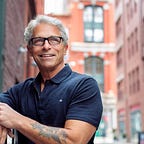What is Your Unique Personal Operating System?
Eight years ago, at 57 years old, I found myself “stranded” on an island of isolation, loneliness, and existential angst, despite having all of the outward signs of great success. How did I slowly drift to this island, without even realizing it?
The journey started once the hazy bubble of my childhood ignorance popped and I was dumped into the dark realities of life in the adult world. As an only child trapped in the day-to-day hell of the emotional and physical brutality of living with an alcoholic suicidal mother and a violent step father, I boarded a speed boat that led me to the streets, to 24 arrests, multiple reform school stints, and to dropping out of high school and joining the Navy to avoid prison.
After the Navy a near fatal car crash slammed me into a new speedboat that charted a new course that led to medical school, surgery residency, and ultimately into a great 20 year academic surgical career at the University of Minnesota. There I achieved things that I and most people would have considered impossible given my beginnings: I became a full professor, landed an endowed chair, grew a busy clinical practice, and became the program director of the general surgical residency training program.
Yet over that 20 years, my overall level of contentment slowly drifted downward, and my internal moods and emotions showed greater variations around the contentment curve, never displayed of course.
Being a male, a surgeon, and someone who survived such a daunting early life, I kept silent about my inner life. But these were not the only reasons I stayed silent. I believed that I had no right to have those feelings, and I felt guilty for even having them, since I had so many great things in my life.
The tools, or habits, that drove me to overcome the hardships of my early life and go to medical school were discipline, grit, and perseverance, habits dramatically reinforced and strengthened by surgical training. The other tool was exercise, a habit I adopted after the near fatal car accident. Running and lifting weights were my go to drug for stress management. Then major back problems, a 5 level lumbar fusion, and degenerative hip disease forced me to stop running. The speedboat of my life had run out of gas and drifted up on the shores of my island of existential angst and loneliness, and I lacked the tools to rescue myself.
After much reflection, I can see how I ended up on that island. My cherished personal operating system slowly started to fail me. The habits of discipline, grit, and perseverance, so useful and essential for pulling me out of the gutter and for becoming a surgeon, were inadequate for the new challenges I was facing. I couldn’t just push through and muscle my way out of loneliness, fear of aging, being constantly overextended, lack of real connection with my loved ones, and just plain trying to keep up with everything that I overcommitted to.
For most of us human beings, our unique personal operating system slowly develops over time, and it does so with little attention or intention on our parts. We are all born with a unique set of genes, and then we enter the training ground of our family and schools where we acquire a multitude of habits of mind and action. Then on to college and to our career where more new habits are piled on. Throw in significant life experiences (eg. major illness or injury, loss of a loved one, emotional traumas) and by the time you are 30 the basket of habits you have gathered that comprise your unique personal operating system is humming along, for better or for worse.
Unlike Steve Jobs who set out to intentionally create Apple’s operating system, for each of us the development of our unique personal operating system is nearly, if not totally, random, unless of course your parents are more like Steve Jobs. If we are “successful” there is little if any pressure to upgrade or change it. And even if we are not successful in some areas of our life, say relationships, there is always the outside world to blame.
But awareness of this idea gives pause and the opportunity to cultivate and change our personal operating system, intentionally, and in the direction of our choosing. In his beautiful book The Five Invitations: Discovering What Death Can Teach Us About Living Fully, Frank Ostaseski writes about his experience and lessons learned as director of the Zen Hospice Project in San Francisco. He notes that:
“The habits of our lives have a powerful momentum that propels us toward the moment of our death. The obvious question arises: What habits do we want to create? Our thoughts are not harmless. Thoughts manifest as actions, which in turn develop into habits, and our habits ultimately harden into character. Our unconscious relationship to thoughts can shape our perceptions, trigger reactions, and predetermine our relationship to the events of our lives”.
So, what habits would you like to create?
